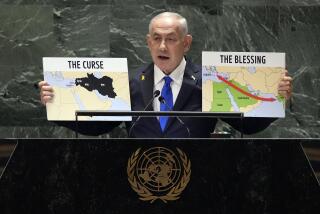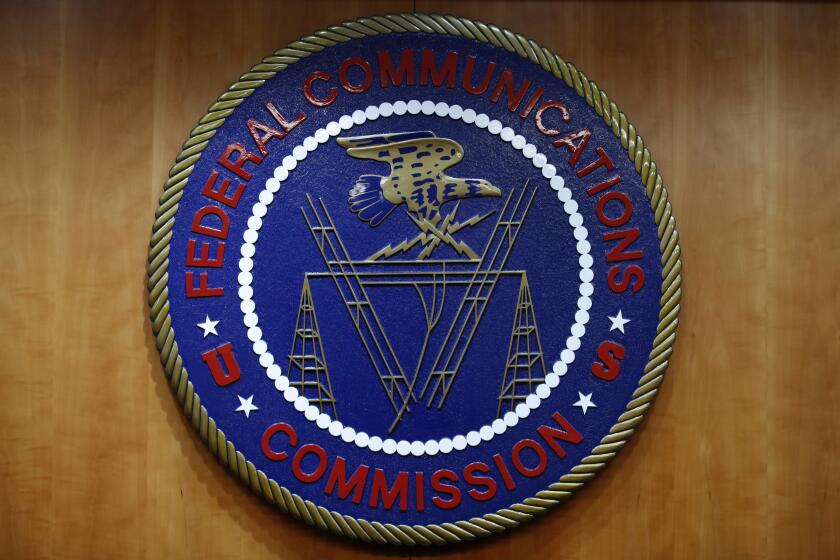Obama, in speech, tells Israel its future depends on a Palestinian state
JERUSALEM — Evoking the Jewish people’s biblical struggle for freedom, President Obama called upon Israelis Thursday to sweep aside deep skepticism and embrace a Palestinian state as the only way to guarantee their nation’s future.
In a soaring speech in Jerusalem that was billed as the main event of his three-day Holy Land trip, Obama said in an auditorium of cheering university students that as the generation of Israel’s founding fathers fades, it falls to them to write the young nation’s next chapter. Ending the West Bank occupation is critical to preserving a Jewish and democratic state, he told them.
“You can be the generation that permanently secures the Zionist dream, or you can face a growing challenge to its future,” he said. “The only way to truly protect the Israeli people is through the absence of war, because no wall is high enough, and no Iron Dome is strong enough, to stop every enemy from inflicting harm.”
The president pointed to the Jewish people’s own history of slavery and genocide, and asked the crowd to consider the plight of neighboring Palestinians, who live under military occupation, can’t move freely and have no country to call their own.
“Put yourself in their shoes, look at the world through their eyes,” he said. “Just as Israelis built a state in their homeland, Palestinians have a right to be a free people in their own land.”
It was a rousing, well-received address reminiscent of Obama’s campaign speeches.
“You must create the change that you want to see,” he told more than 1,000 students, many of whom won coveted tickets to attend through lotteries.
But it was a speech that focused on shared dreams rather than thorny details, which are what have crippled the peace process for years. Though Israeli government officials were probably relieved that Obama announced no new conditions or demands, the lack of specific initiatives or policy frameworks left questions about whether it was enough to nudge the peace process ahead.
Some likened the address to Obama’s 2009 speech in Cairo, when the president called for a new relationship between the United States and the Muslim world.
That landmark speech left many Israelis with the impression that Obama was trying to distance himself from Israel. The visit this week, and particularly the speech, were seen as attempts to change that view and assure Israelis of U.S. support.
“It was good to hear of his support for Israel. That means a lot,” said Yocheved Loewenstern, 22, a neuroscience student who was in the audience. “But if you ask any kid in Israel, they’ll say they want peace. The problem is, it’s hard to make peace with a country that doesn’t recognize your rights to be here.”
The speech may signal that Obama is preparing to renew an American-led peace initiative, despite the administration’s attempts to lower expectations of his trip. He recently appointed a new Mideast envoy, and newly installed Secretary of State John F. Kerry is expected to return to the region Saturday.
“He’s showed an American political will,” said Ziad Asali, president of the American Task Force on Palestine, an advocacy group in Washington.
Obama made a concerted effort in his first term to tackle the conflict, appointing a special envoy, pushing Israel to temporarily freeze some settlement construction and pressing Prime Minister Benjamin Netanyahu to publicly endorse the concept of a Palestinian state, something no leader of the conservative Likud Party had ever done.
But after encountering resistance and defiance from both sides, Obama withdrew to the sidelines, and some questioned whether he had the passion to try again.
Thursday’s speech hinted at a shift in tactics.
In Obama’s first term, “he went in with guns blazing,” said Zvika Krieger, senior vice president at the S. Daniel Abraham Center for Mideast Peace in Washington. “But that didn’t work. This time his approach is, ‘Let’s hear the parties out.’ That’s smart.”
Skeptical Israelis suspect that Obama’s kind words may soon be followed by sharper demands.
“Is this a different tactic in which someone has smeared honey on a plastic spoon that will one day turn back into a sharp knife?” wondered Maariv newspaper columnist Shalom Yerushalmi.
Stark differences remain between Israelis and Palestinians, suggesting that even if talks resume, results will be hard to achieve.
During a visit earlier Thursday to the Palestinian Authority’s headquarters in Ramallah, in the West Bank, Obama voiced empathy with Palestinians living under Israeli occupation and reasserted the U.S. commitment to helping them obtain a state.
“The Palestinian people deserve an end to occupation and the daily indignities that come with it,” Obama said. But he said both sides need to set aside old entrenched positions and “think anew.”
Most Palestinians are wary of Obama, saying he has failed to make much progress. Some activists protested against the president, burning American flags and defacing posters of him.
But after meeting with Obama, Palestinian Authority President Mahmoud Abbas said at a news conference that he had renewed confidence that the administration would intensify efforts to kick-start the peace process. Neither leader announced any specific agreements or steps.
Abbas told Obama that before negotiations can resume, Israel must halt settlement construction, which the international community views as illegal. Obama, however, has toned down his language on settlements, which he described in 2009 as illegitimate.
On Thursday he said they were not “constructive” or “appropriate,” and he seemed to endorse the Israeli position that the issue should not be used as a precondition for renewed talks.
Worried that Netanyahu might again face pressure from Obama to freeze settlement construction, right-wing Israeli politicians are already warning the prime minister against such a step. Jewish Home party leader Naftali Bennett, a key member of Netanyahu’s new coalition, said he would withdraw from the government if another freeze was called.
“Israel’s position is very clear and I am glad to see the American position moving closer to it too,” said Israel’s deputy foreign minister, Zeev Elkin.
Shortly before the president’s trip to the West Bank, Gaza Strip militants fired two rockets at the southern Israeli city of Sderot. The strikes, which caused damage but no injuries, broke a cease-fire agreement that has largely held since November between Israel and Hamas, the Islamist militant group that controls Gaza.
Obama condemned the attack and criticized Hamas for refusing to renounce violence.
“Hamas cares more about enforcing its own rigid dogmas than allowing Palestinians to live freely,” he said. “Too often if focuses on tearing Israel down, rather than building Palestine up.”
Times staff writer Paul Richter in Washington, news researcher Batsheva Sobelman in The Times’ Jerusalem bureau and special correspondent Maher Abukhater in Ramallah contributed to this report.
More to Read
Sign up for Essential California
The most important California stories and recommendations in your inbox every morning.
You may occasionally receive promotional content from the Los Angeles Times.










